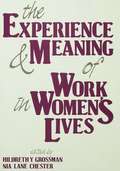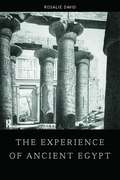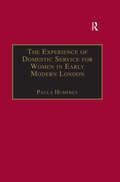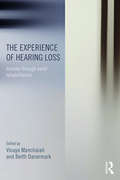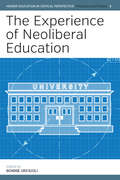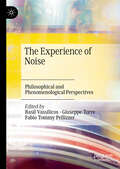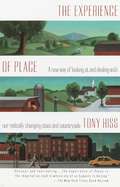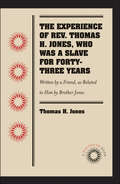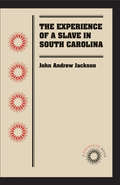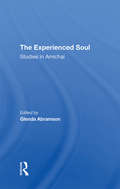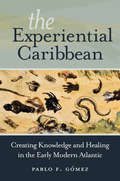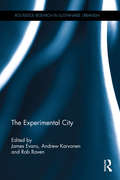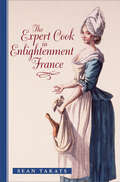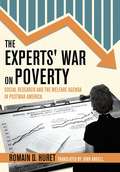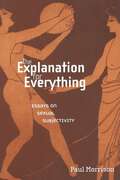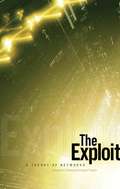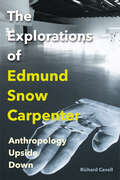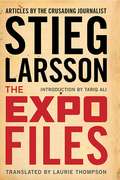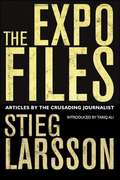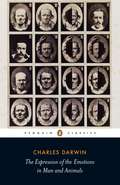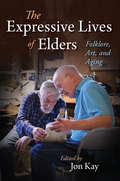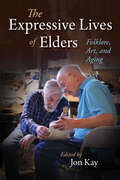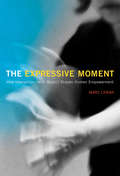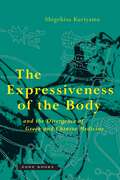- Table View
- List View
The Experience and Meaning of Work in Women's Lives
by Hildreth Y. Grossman Nia Lane ChesterIn the past, social scientists have relied predominantly on traditional models of work to understand women's experiences. These models, however, have been based on men's occupational experiences, which have been assumed to be the same for women. More recently, researchers and theorists from a variety of disciplines have begun to challenge earlier assumptions as inaccurate reflections of the realities for female workers. Newer studies have concentrated on the historical and social reasons for women's employment and career choices, including changes in economy, family, and social conditions. To provide a deeper understanding of women worker's realities by including the meaning they make of their work experiences, the editors have assembled the research of social scientists from various disciplines whose investigations focused exclusively on this subject. Their qualitative methodology provides a forum for women to voice issues, raise questions, and share self-reflections about their work experiences and the meaning they make of their work in the context of the rest of their lives. The common themes that are interwoven within the fabric of women's work experience are: the need to expand traditional definitions of what constitutes "work;" the fluid nature of boundaries between personal life and work life; the importance of the relational aspects of their work; the issues related to the uses of power at work; the role of work in the development of women's sense of self and personal identity; and the degree to which women's work experience is colored by discrimination and sexism.
The Experience of Ancient Egypt (Experience of Archaeology)
by Rosalie DavidThe Experience of Ancient Egypt provides a comprehensive portrait of what we know about ancient Egypt today, examining in detail issues of religion, of beliefs and practices surrounding death, of everyday life and of literature.In an engaging style, the author traces Egyptology from its classical roots, through the painstaking process of deciphering Egyptian hieroglyphs in the eighteenth and nineteenth centuries, to the most up-to-date bio-medical and archaeological techniques, never forgetting how time has proved that it is impossible to deliver the absolute truth about ancient Egypt.
The Experience of Domestic Service for Women in Early Modern London (The Early Modern Englishwoman, 1500-1750: Contemporary Editions)
by Paula HumfreyThe late seventeenth- and early eighteenth-century texts presented here describe female servants' experiences of work in early modern London. Domestics' court depositions offer qualitative evidence that female servants were an important support of emergent capitalism in the early modern metropolis. Exposed here are the contractual underpinnings of domestic service for women; the mobility that domestic servants enjoyed; and the concern that this mobility generated in the authorities. Paid domestic work has traditionally been regarded by historians simply as a pre-marital phase of women's lives. In fact, the depositions in this volume show that service was a prototypical form of female wage labour. While some women left service once they married, others relied on domestic positions as an avenue to generating income as life-long single women, as married women, and as widows. Even though they usually lived in poverty, labouring women who worked as servants in London had considerably more agency than has earlier been recognized. Female servants who deposed before London ecclesiastical and parish courts three centuries ago were mostly non-literate. Strikingly, their individual voices are clear and distinct as they present information about their working and personal circumstances.
The Experience of Hearing Loss: Journey Through Aural Rehabilitation
by Berth Danermark Vinaya ManchaiahHearing loss is a common chronic condition which is often poorly recognized but can have multiple negative impacts, not just on the lives of those directly affected, but also those living with them. People with impaired hearing may begin a long and uncertain journey involving a number of key stages, from emerging awareness and help-seeking, to diagnosis, adjustment, and self-evaluation. Based on a model of person-centered audiological rehabilitation, this book explains why it is important to understand both patients’ own experiences, and those of their communication partners, over time. It focuses particularly on the human dynamics of hearing loss, exploring the broader consequences of hearing loss for the individual, family members, and wider society. In particular the book: gives insight into the patients' and their communication partners’ experiences and perspectives through clear and telling first-hand narrative accounts; examines how people understand their own hearing loss, reflect on their experiences with hearing aids – both positive and negative – and evaluate treatment options; considers the changes needed to conversations in order to include all communication partners, whether with impaired hearing or not; and discusses consequences of hearing loss using the International Classification of Functioning, Disability and Health (ICF). With its explicit aim to increase awareness of the need to include the patient and close relatives in the process of rehabilitation, this new text makes an important contribution to further improve evidence-based practice in the field of audiological rehabilitation. An ideal text for audiology, ENT, and nursing students of all levels.
The Experience of Neoliberal Education (Higher Education in Critical Perspective: Practices and Policies #4)
by Bonnie UrciuoliThe college experience is increasingly positioned to demonstrate its value as a worthwhile return on investment. Specific, definable activities, such as research experience, first-year experience, and experiential learning, are marketed as delivering precise skill sets in the form of an individual educational package. Through ethnography-based analysis, the contributors to this volume explore how these commodified "experiences" have turned students into consumers and given them the illusion that they are in control of their investment. They further reveal how the pressure to plan every move with a constant eye on a demonstrable return has supplanted traditional approaches to classroom education and profoundly altered the student experience.
The Experience of Noise: Philosophical and Phenomenological Perspectives
by Giuseppe Torre Basil Vassilicos Fabio Tommy PellizzerThis volume&’s aim is to stimulate philosophical interest in the experience of noise. There are at least three important open questions about noise. First, how should the relationship between noise as a scientific phenomenon and as a type of experience be understood? Is the one to be understood in terms of the other, and what implications may be drawn from this? Second, are experiences of noise strictly limited to perceptual states or to one type of perceptual state – for instance, to acoustic experiences? E.g. is there noise that is visual or tactile? Is there noise that is cognitive, affective, or evaluative? Third, how can philosophy make sense of noise in the first place? Should noise simply be relegated to the hither side of the explananda of philosophy, as the mere leftover of whatever philosophy sets out to account for; meaning, being, totality, etc.? Or may noise be understood as a positive phenomenon in its own right, which has its own distinctive features and content, difficult though they might be to pin down? This volume will contribute to the burgeoning philosophy of noise by highlighting how contemporary philosophical perspectives with a phenomenological or experiential bent can make inroads to these questions about a fascinating yet little understood quarter of human experience.
The Experience of Place: A New Way of Looking at and Dealing With our Radically Changing Cities and Count ryside
by Tony Hiss'The Experience of Place' offers an innovative and delightfully readable proposal for new ways of planning, building, and managing our most immediate and overlooked surroundings.
The Experience of Rev. Thomas H. Jones, Who Was a Slave for Forty-Three Years
by Thomas H. JonesOriginally published in order to raise money to purchase his son's freedom, Thomas Jones's autobiography first appeared in the 1850s. This version, published in 1885, includes not only Jones's account of his childhood and young adult life as a slave in North Carolina, but also a long additional section in which Jones describes his experiences as a minister in North Carolina, while still enslaved, and then on the abolitionist lecture circuit in Massachusetts and the Maritime Provinces of Canada after he stowed away on a ship bound for New York in 1849. The narrative's most prominent focus is on Jones's ministry in and around Wilmington, North Carolina, before he escaped. The narrative puts a characteristically postbellum emphasis on shared religious devotion and even fondness between African Americans and whites. Perhaps the most compelling scene, however, is Jones's account of his forcible separation from his first wife and their three children, whom he never saw again.A DOCSOUTH BOOK. This collaboration between UNC Press and the University of North Carolina at Chapel Hill Library brings selected classic works from the digital library of Documenting the American South back into print. DocSouth Books uses the latest digital technologies to make these works available as downloadable e-books or print-on-demand publications. DocSouth Books are unaltered from the original publication, providing affordable and easily accessible editions to a new generation of scholars, students, and general readers.
The Experience of a Slave in South Carolina
by John Andrew JacksonIn The Experience of a Slave in South Carolina, escaped slave John Andrew Jackson seeks to educate his readers on the horrors of slavery. He spares no details in relating the murder of his sister, the separation of his family, and his own frequent whippings at the hands of a "Christian" master and mistress. He offers a scathing review of white religious hypocrisy, criticizing those who could not see the contradiction between worshiping a merciful God on Sundays and holding slaves under inhumane conditions. Jackson details his escape from slavery into Massachusetts as a ship stowaway after he is separated by sale from his first wife and child. He also describes his interactions with Harriet Beecher Stowe; his failed attempts to purchase the freedom of his family members; and his eventual escape into Canada following the passage of the Fugitive Slave Law. His work also includes a variety of carefully recorded hymns and antislavery songs. Jackson would eventually flee to England with his second wife before returning to South Carolina after the War. A DOCSOUTH BOOK. This collaboration between UNC Press and the University of North Carolina at Chapel Hill Library brings selected classic works from the digital library of Documenting the American South back into print. DocSouth Books uses the latest digital technologies to make these works available as downloadable e-books or print-on-demand publications. DocSouth Books are unaltered from the original publication, providing affordable and easily accessible editions to a new generation of scholars, students, and general readers.
The Experienced Soul: Studies In Amichai
by Glenda AbramsonYehuda Amichai is Israel's foremost poet as well as a significant novelist and dramatist. He has received every major Israeli prize for literature, and his poetry has been translated into over twenty languages. Amichai has served as poet-in-residence at major universities across the United States and has been a Sequent visitor to the University of Oxford. In this volume, the world's leading authorities on Amichai explore all the major genres and themes of his work. The result is an important book that is a unique and comprehensive scholarly overview of a major twentieth-century literary figure. It will prove especially valuable to those teaching modern Hebrew literature at English-language universities.
The Experiential Caribbean: Creating Knowledge and Healing in the Early Modern Atlantic
by Pablo F. GómezOpening a window on a dynamic realm far beyond imperial courts, anatomical theaters, and learned societies, Pablo F. Gomez examines the strategies that Caribbean people used to create authoritative, experientially based knowledge about the human body and the natural world during the long seventeenth century. Gomez treats the early modern intellectual culture of these mostly black and free Caribbean communities on its own merits and not only as it relates to well-known frameworks for the study of science and medicine.Drawing on an array of governmental and ecclesiastical sources—notably Inquisition records—Gomez highlights more than one hundred black ritual practitioners regarded as masters of healing practices and as social and spiritual leaders. He shows how they developed evidence-based healing principles based on sensorial experience rather than on dogma. He elucidates how they nourished ideas about the universality of human bodies, which contributed to the rise of empirical testing of disease origins and cures. Both colonial authorities and Caribbean people of all conditions viewed this experiential knowledge as powerful and competitive. In some ways, it served to respond to the ills of slavery. Even more crucial, however, it demonstrates how the black Atlantic helped creatively to fashion the early modern world.
The Experimental City (Routledge Research in Sustainable Urbanism)
by James Evans, Andrew Karvonen and Rob RavenThis book explores how the concept or urban experimentation is being used to reshape practices of knowledge production in urban debates about resilience, climate change governance, and socio-technical transitions. With contributions from leading scholars, and case studies from the Global North and South, from small to large scale cities, this book suggests that urban experiments offer novel modes of engagement, governance, and politics that both challenge and complement conventional strategies. The book is organized around three cross-cutting themes. Part I explores the logics of urban experimentation, different approaches, and how and why they are deployed. Part II considers how experiments are being staged within cities, by whom, and with what effects? Part III examines how entire cities or groups of cities are constructed as experiments. This book seeks to contribute a deeper and more socially and politically nuanced understanding of how urban experiments shape cities and drive wider changes in society, providing a framework to examine the phenomenon of urban experimentation in conceptual and empirical detail.
The Expert Cook in Enlightenment France (The Johns Hopkins University Studies in Historical and Political Science #129)
by Sean TakatsIn the eighteenth-century French household, the servant cook held a special place of importance, providing daily meals and managing the kitchen and its finances. In this scrupulously researched and witty history, Sean Takats examines the lives of these cooks as they sought to improve their position in society and reinvent themselves as expert, skilled professionals.Much has been written about the cuisine of the period, but Takats takes readers down into the kitchen and introduces them to the men and women behind the food. It is only in that way, Takats argues, that we can fully recover the scientific and cultural significance of the meals they created, and, more important, the contributions of ordinary workers to eighteenth-century intellectual life. He shows how cooks, along with decorators, architects, and fashion merchants, drove France’s consumer revolution, and how cooks' knowledge about a healthy diet and the medicinal properties of food advanced their professional status by capitalizing on the Enlightenment’s new concern for bodily and material happiness. The Expert Cook in Enlightenment France explores a unique intersection of cultural history, labor history, and the history of science and medicine. Relying on an unprecedented range of sources, from printed cookbooks and medical texts to building plans and commercial advertisements, Takats reconstructs the evolving role of the cook in Enlightenment France. Academics and students alike will enjoy this fascinating study of the invention of the professional chef, of how ordinary workers influenced emerging trends of scientific knowledge, culture-creation, and taste in eighteenth-century France.
The Experts' War on Poverty: Social Research and the Welfare Agenda in Postwar America (American Institutions and Society)
by Romain D. HuretIn the critically acclaimed La Fin de la Pauverté?, Romain D. Huret identifies a network of experts who were dedicated to the post-World War II battle against poverty in the United States. John Angell's translation of Huret's work brings to light for an English-speaking audience this critical set of intellectuals working in federal government, academic institutions, and think tanks. Their efforts to create a policy bureaucracy to support federal socio-economic action spanned from the last days of the New Deal to the late 1960s when President Richard M. Nixon implemented the Family Assistance Plan. Often toiling in obscurity, this cadre of experts waged their own war not only on poverty but on the American political establishment. Their policy recommendations, as Huret clearly shows, often militated against the unscientific prejudices and electoral calculations that ruled Washington D.C. politics.The Experts' War on Poverty highlights the metrics, research, and economic and social facts these social scientists employed in their work, and thereby reveals the unstable institutional foundation of successive executive efforts to grapple with gross social and economic disparities in the United States. Huret argues that this internal war, coming at a time of great disruption due to the Cold War, undermined and fractured the institutional system officially directed at ending poverty. The official War on Poverty, which arguably reached its peak under President Lyndon B. Johnson, was thus fomented and maintained by a group of experts determined to fight poverty in radical ways that outstripped both the operational capacity of the federal government and the political will of a succession of presidents.
The Explanation For Everything: Essays on Sexual Subjectivity (Sexual Cultures #31)
by Paul Morrison"The claim 'I'm straight' is the psychosexual analogue of 'The check is in the mail': if you need to say it, your credit or creditability is already in doubt." So begins Paul Morrison's dazzling polemic, which takes as its point of departure Foucault's famous remark that sex is "the explanation for everything." Combining psychoanalytic, literary, and queer theory, The Explanation for Everything seeks to account for the explanatory power attributed to homosexuality, and its relationship to compulsory heterosexuality. In the process, Morrison presents a scathing indictment of psychoanalysis and its impact on the study of sexuality. In bold but graceful leaps, Morrison applies his critique to a diversity of examples: subjectivity in Oscar Wilde, the cultural construction and reception of AIDS, the work of Robert Mapplethorpe, the practice of bodybuilding, and the contemporary reception of the sexual politics of fascism. Analytical, witty and astute, The Explanation for Everything will challenge and amuse, establishing Paul Morrison as one of our most exciting cultural critics.
The Exploit: A Theory of Networks (Electronic Mediations #21)
by Alexander R. Galloway Eugene ThackerThe network has become the core organizational structure for postmodern politics, culture, and life, replacing the modern era&’s hierarchical systems. From peer-to-peer file sharing and massive multiplayer online games to contagion vectors of digital or biological viruses and global affiliations of terrorist organizations, the network form has become so invasive that nearly every aspect of contemporary society can be located within it.Borrowing their title from the hacker term for a program that takes advantage of a flaw in a network system, Alexander R. Galloway and Eugene Thacker challenge the widespread assumption that networks are inherently egalitarian. Instead, they contend that there exist new modes of control entirely native to networks, modes that are at once highly centralized and dispersed, corporate and subversive. In this provocative book-length essay, Galloway and Thacker argue that a whole new topology must be invented to resist and reshape the network form, one that is as asymmetrical in relationship to networks as the network is in relation to hierarchy.
The Explorations of Edmund Snow Carpenter: Anthropology Upside Down
by Richard CavellEdmund Snow Carpenter (1922–2011), shaped by an early encounter with Marshall McLuhan, was a renegade anthropologist who would plumb the connection between anthropology and media studies over a thoroughly unconventional career.As co-conspirators in the founding of the legendary journal Explorations (1953–59), Carpenter and McLuhan established the groundwork for media studies. After ten years teaching anthropology at the University of Toronto, hosting radio and television shows on the CBC, and doing major research in the Arctic, Carpenter left Toronto and became an itinerant anthropologist. He took up a position in Papua New Guinea, where he countered anthropological practice by handing his camera to the Papuans. Carpenter’s marriage to the artist and heiress Adelaide de Menil made him a truly independent scholar. With the support of the Rock Foundation, founded by de Menil, he collected ethnographical art, curated exhibitions, and edited the materials for a twelve-volume study of social symbolism based on the massive archives created by Carl Schuster. Richard Cavell shows Carpenter – austere, generous, and unpredictable – to also be unwavering in working throughout his career within the framework established by Explorations.The anthropological impetus for media studies has largely been forgotten. This study restores that memory, tracing Carpenter’s work in media and in anthropology over a lifetime of cultural achievements and intellectual convolutions.
The Expo Files
by Tariq Ali Laurie Thompson Stieg LarssonNow almost exclusively known as the author of the bestselling Millennium Trilogy, Stieg Larsson was first and foremost a professional journalist and an untiring crusader for democracy and equality.Collected in English for the first time, the articles in this volume explore the human rights issues that formed the ideological foundation of his explosive trio of novels. Before he ever began his cycle of novels about the travails of Mikael Blomkvist and Lisbeth Salander, Stieg Larsson used the pulpit of the media to denounce right-wing extremism throughout Europe. A co-founder of the influential journal EXPO and its primary editor for many years, Larsson spoke out passionately against many of the worst crimes against women, minorities, and other disenfranchised communities. These unflinching articles showcase Larsson's spare style and sly humor as he dissects many instances of persistent anti-humanist behavior and politics. Written with the urgency and economy of someone who knew that there is no time to waste when it comes to fighting the forces of bigotry, sexism, and racism, The EXPO Files is required reading not just for fans of the Millennium Trilogy, but everyone who applauds writers with the courage to denounce evil when they see it. From the Hardcover edition.
The Expo Files: Articles by the Crusading Journalist
by Stieg LarssonNow almost exclusively known as the author of the bestselling Millennium Trilogy, as a professional journalist Stieg Larsson was an untiring crusader for democracy and equality. As a reporter and editor-in-chief on the journal Expo he researched the extreme right both in Sweden and at an international level. Collected here for the first time are essays and articles on right-wing extremism and racism, on violence against women and women's rights, on homophobia and honour killings. Larsson never ceased to fight for and write about his most firmly held principles; it was his commitment to these which gave his best-selling novels their explosive force.
The Expo Files: Articles by the Crusading Journalist
by Stieg LarssonNow almost exclusively known as the author of the bestselling Millennium Trilogy, as a professional journalist Stieg Larsson was an untiring crusader for democracy and equality. As a reporter and editor-in-chief on the journal Expo he researched the extreme right both in Sweden and at an international level. Collected here for the first time are essays and articles on right-wing extremism and racism, on violence against women and women's rights, on homophobia and honour killings. Larsson never ceased to fight for and write about his most firmly held principles; it was his commitment to these which gave his best-selling novels their explosive force.
The Expression of the Emotions in Man and Animals: The Expression Of The Emotions In Man And Animals (Cambridge Library Collection - Darwin, Evolution And Genetics Ser.)
by Charles DarwinPublished in 1872, The Expression of the Emotions in Man and Animals was a book at the very heart of Darwin's research interests - a central pillar of his 'human' series. This book engaged some of the hardest questions in the evolution debate, and it showed the ever-cautious Darwin at his boldest. If Darwin had one goal with Expression, it was to demonstrate the power of his theories for explaining the origin of our most cherished human qualities: morality and intellect. As Darwin explained, "He who admits, on general grounds, that the structure and habits of all animals have been gradually evolved, will look at the whole subject of Expression in a new and interesting light."
The Expressive Lives of Elders: Folklore, Art, and Aging (Material Vernaculars)
by Jon KayCan traditional arts improve an older adult’s quality of life? Are arts interventions more effective when they align with an elder’s cultural identity? In The Expressive Lives of Elders, Jon Kay and contributors from a diverse range of public institutions argue that such mediations work best when they are culturally, socially, and personally relevant to the participants. From quilting and canning to weaving and woodworking, this book explores the role of traditional arts and folklore in the lives of older adults in the United States, highlighting the critical importance of ethnographic studies of creative aging for both understanding the expressive lives of elders and for designing effective arts therapies and programs. Each case study in this volume demonstrates how folklore and traditional practices help elders maintain their health and wellness, providing a road map for initiatives to improve the lives and well-being of America’s aging population.
The Expressive Lives of Elders: Folklore, Art, and Aging (Material Vernaculars)
by Jon KayEssays examining the power of traditional arts and folklore in the lives of the elderly in the United States.Can traditional arts improve an older adult’s quality of life? Are arts interventions more effective when they align with an elder’s cultural identity? In The Expressive Lives of Elders, Jon Kay and contributors from a diverse range of public institutions argue that such mediations work best when they are culturally, socially, and personally relevant to the participants.From quilting and canning to weaving and woodworking, this book explores the role of traditional arts and folklore in the lives of older adults in the United States, highlighting the critical importance of ethnographic studies of creative aging for both understanding the expressive lives of elders and for designing effective arts therapies and programs. Each case study in this volume demonstrates how folklore and traditional practices help elders maintain their health and wellness, providing a road map for initiatives to improve the lives and well-being of America’s aging population.
The Expressive Moment: How Interaction (with Music) Shapes Human Empowerment
by Marc LemanA new way to understand expressive interaction, focusing on the dynamic, fast, pre-reflective processes underlying interactions with music.The expressive moment is that point in time when we grasp a situation and respond quickly, even before we are aware of it. In this book, Marc Leman argues that expression drives this kind of interaction, and he proposes a general framework for understanding expressive interactions. He focuses on the dynamic, fast, and pre-reflective processes underlying our interactions with music—whether we are playing an instrument, dancing, listening, or using new interactive technologies. Music offers a well-established domain for studying these fast and interactive processes, and Leman argues that understanding the power of expressive interaction through music may help us understand cognitive processing in other domains, including language, human action coordination, human-animal interaction, and human-machine interaction.Leman regards expressive interactions with music as energizing and empowering. He argues that music is based on patterns that intervene with a reinforcing loop in the human brain, strengthening learning, motivation, and reward. He argues further that the reinforcing effect is influenced by the interaction flow, by fast processes that handle expressive qualities on the fly.Leman sets out the framework in which expressive interaction is situated, describing, among other things, a pragmatic model of communication in which the fundamental components are enactment and dynamics. He looks in more detail at the cognitive-motivational architecture, discussing sensorimotor and motivational schemes. Finally, he discusses applications for the concepts behind expressive motivation in such fields as sports, entertainment, rehabilitation, multimedia art, and music education.
The Expressiveness of the Body and the Divergence of Greek and Chinese Medicine
by Shigehisa KuriyamaAn illuminating account of how early medicine in Greece and China perceived the human bodyWinner of the William H. Welch Medal, American Association for the History of MedicineThe true structure and workings of the human body are, we casually assume, everywhere the same, a universal reality. But when we look into the past, our sense of reality wavers: accounts of the body in diverse medical traditions often seem to describe mutually alien, almost unrelated worlds. How can perceptions of something as basic and intimate as the body differ so? In this book, Shigehisa Kuriyama explores this fundamental question, elucidating the fascinating contrasts between the human body described in classical Greek medicine and the body as envisaged by physicians in ancient China. Revealing how perceptions of the body and conceptions of personhood are intimately linked, his comparative inquiry invites us, indeed compels us, to reassess our own habits of feeling and perceiving.
